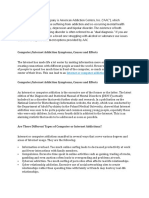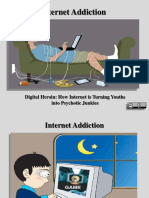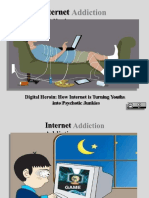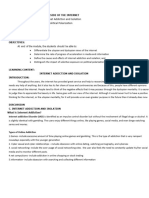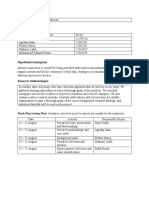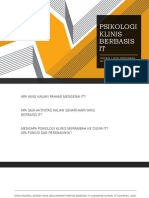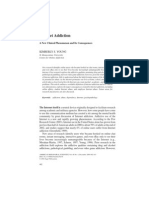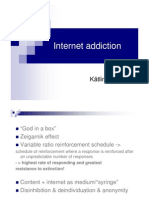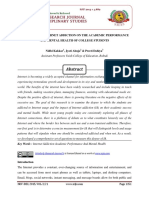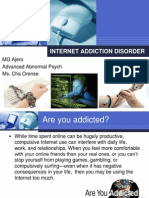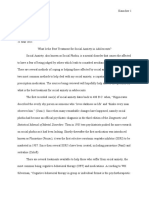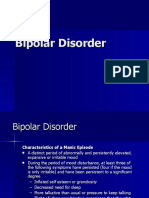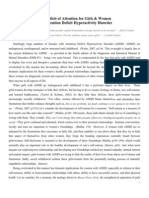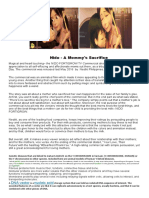What is Internet addiction?
Internet addiction is described as an impulse control disorder, which does not involve use of
an intoxicating drug and is very similar to pathological gambling. Some Internet users may
develop an emotional attachment to on-line friends and activities they create on their
computer screens. Internet users may enjoy aspects of the Internet that allow them to meet,
socialize, and exchange ideas through the use of chat rooms, social networking websites, or
"virtual communities." Other Internet users spend endless hours researching topics of
interest Online or "blogging". Blogging is a contraction of the term "Web log", in which an
individual will post commentaries and keep regular chronicle of events. It can be viewed as
journaling and the entries are primarily textual.
Similar to other addictions, those suffering from Internet addiction use the virtual fantasy world
to connect with real people through the Internet, as a substitution for real-life human
connection, which they are unable to achieve normally.
What are the warning signs of Internet addiction?
Preoccupation with the Internet. (Thoughts about previous on-line activity or
anticipation of the next on-line session.)
Use of the Internet in increasing amounts of time in order to achieve satisfaction.
Repeated, unsuccessful efforts to control, cut back or stop Internet use.
Feelings of restlessness, moodiness, depression, or irritability when attempting to cut
down use of the Internet.
On-line longer than originally intended.
Jeopardized or risked loss of significant relationships, job, educational or career
opportunities because of Internet use.
Lies to family members, therapists, or others to conceal the extent of involvement with
the Internet.
Use of the Internet is a way to escape from problems or to relieve a dysphoric mood.
(e.g. Feelings of hopelessness, guilt, anxiety, depression.)
What are the effects?
Internet addiction results in personal, family, academic, financial, and occupational problems
that are characteristic of other addictions. Impairments of real life relationships are disrupted
as a result of excessive use of the Internet. Individuals suffering from Internet addiction
spend more time in solitary seclusion, spend less time with real people in their lives, and are
often viewed as socially awkward. Arguments may result due to the volume of time spent online. Those suffering from Internet addiction may attempt to conceal the amount of time spent
on-line, which results in distrust and the disturbance of quality in once stable relationships.
Some suffering from Internet addiction may create on-line personas or profiles where they are
able to alter their identities and pretend to be someone other than himself or herself. Those
at highest risk for creation of a secret life are those who suffer from low-self esteem feelings
�of inadequacy, and fear of disapproval. Such negative self-concepts lead to clinical problems
of depression and anxiety.
Many persons who attempt to quit their Internet use experience withdrawal including: anger,
depression, relief, mood swings, anxiety, fear, irritability, sadness, loneliness, boredom,
restlessness, procrastination, and upset stomach. Being addicted to the Internet can also
cause physical discomfort or medical problems such as: Carpal Tunnel Syndrome, dry eyes,
backaches, severe headaches, eating irregularities, (such as skipping meals), failure to attend
to personal hygiene, and sleep disturbance.
How can someone get help?
The first step is to determine if there is a problem. A Certified Addictions Counselor trained in
identification and treatment of Internet addiction can effectively perform an assessment to
determine what level of care is most appropriate. For a free confidential assessment, call the
Illinois Institute for Addiction Recovery at (800) 522-3784. An assessment can be completed
24 hours a day, 7 days a week. Appointments are preferred, but walk-ins are always
welcome.
Sources: "Virtual Addiction" David N. Greenfield, Ph.D., "Caught in the Net" Dr. Kimberly
Young, Center for Internet Addiction Recovery, American Psychiatric Association.
"The team at the IIAR truly provided me with the tools to discover recovery from my Internet addiction."
Jacob A.
http://www.addictionrecov.org/Addictions/index.aspx?AID=43
Internet Addiction: Symptoms, Evaluation, And Treatment
Dr. Kimberly S. Young
This article is reproduced from Innovations in Clinical Practice (Volume 17) by L. VandeCreek & T. L.
Jackson (Eds.), Sarasota, FL: Professional Resource Press. Copyright 1999 by Professional Resource
Exchange, Inc. and reprinted with permission. Further electronic/printed circulation or duplication is
strictly prohibited without explicit written authorization from Professional Resource Exchange, Inc.
SUMMARY The Internet itself is a neutral device originally designed to facilitate research among
academic and military agencies. How some people have come to use this medium, however, has
created a stir among the mental health community by great discussion of Internet addiction. Addictive
use of the Internet is a new phenomenon which many practitioners are unaware of and subsequently
unprepared to treat. Some therapists are unfamiliar with the Internet, making its seduction difficult to
understand. O ther tim es, its im pact on the individuals life is m inim ized. T he purpose of this
chapter is to enable clinicians to better detect and treat Internet addiction. The chapter will first focus
on the complications of diagnosis of Internet addiction. Second, the negative consequences of such
Internet abuse are explored. Third, how to properly assess and identify triggers causing the onset of
pathological Internet use are discussed. Fourth, a number of recovery strategies are presented. Lastly,
since Internet addiction is an emergent disorder, implications for future practice are presented.
�COMPLICATIONS IN DIAGNOSING INTERNET ADDICTION Notions of technological addictions
(Griffiths, 1996) and computer addiction (Shotton, 1991) have previously been studied in England.
However, when the concept of Internet addiction was first introduced in a pioneer study by Young
(1996), it sparked a controversial debate by both clinicians and academicians. Part of this controversy
revolved around the contention that only physical substances ingested into the body could be termed
"addictive." While many believed the term addiction should be applied only to cases involving the
ingestion of a drug (e.g., Rachlin, 1990; Walker, 1989), defining addiction has moved beyond this to
include a number of behaviors which do not involve an intoxicant such as compulsive gambling
(Griffiths, 1990), video game playing (Keepers, 1990), overeating (Lesuire & Bloome, 1993), exercise
(Morgan, 1979), love relationships (Peele & Brody, 1975), and television-viewing (Winn, 1983).
Therefore, linking the term "addiction" solely to drugs creates an artificial distinction that strips the
usage of the term for a similar condition when drugs are not involved (Alexander & Scheweighofer,
1988). The other controversial element related to the use of the Internet addiction is that unlike
chemical dependency, the Internet offers several direct benefits as a technological advancement in our
society and not a device to be criticized as "addictive" (Levy, 1996). The Internet allows a user a range
of practical applications such as the ability to conduct research, to perform business transactions, to
access international libraries, or to make vacation plans. Furthermore, several books have been written
which outline the psychological as well as functional benefits of Internet use in our daily lives
(Rheingold, 1993; Turkle, 1995). In comparison, substance dependence is not an integral aspect of our
professional practice nor does it offer a direct benefit for its routine usage. In general, the Internet is a
highly promoted technological tool making detection and diagnosis of addiction difficult. Therefore, it
is essential that the skilled clinician understand the characteristics which differentiate normal from
pathological Internet use. Proper diagnosis is often complicated by the fact that there is currently no
accepted set of criteria for addiction much less Internet addiction listed in the Diagnostic and Statistical
Manual of Mental Disorders - Fourth Edition (DSM-IV; American Psychiatric Association, 1995). Of
all the diagnoses referenced in the DSM-IV, Pathological Gambling was viewed as most akin to the
pathological nature of Internet use. By using Pathological Gambling as a model, Internet addiction can
be defined as an impulse-control disorder which does not involve an intoxicant. Therefore, Young
(1996) developed a brief eight-item questionnaire which modified criteria for pathological gambling to
provide a screening instrument for addictive Internet use: 1. Do you feel preoccupied with the Internet
(think about previous on-line activity or anticipate next on-line session)? 2. Do you feel the need to use
the Internet with increasing amounts of time in order to achieve satisfaction? 3. Have you repeatedly
made unsuccessful efforts to control, cut back, or stop Internet use? 4. Do you feel restless, moody,
depressed, or irritable when attempting to cut down or stop Internet use? 5. Do you stay on-line longer
than originally intended? 6. Have you jeopardized or risked the loss of significant relationship, job,
educational or career opportunity because of the Internet? 7. Have you lied to family members,
therapist, or others to conceal the extent of involvement with the Internet? 8. Do you uses the Internet
as a way of escaping from problems or of relieving a dysphoric mood (e.g., feelings of helplessness,
guilt, anxiety, depression)? Patients were considered "addicted" when answering "yes" to five (or more)
of the questions and when their behavior could not be better accounted for by a Manic Episode. Young
(1996) stated that the cut off score of "five" was consistent with the number of criteria used for
Pathological Gambling and was seen as an adequate number of criteria to differentiate normal from
pathological addictive Internet use. I should note that while this scale provides a workable measure of
Internet addiction, further study is needed to determine its construct validity and clinical utility. I
should also note that a patients d enial of addictive use is likely to be reinforced due to the encouraged
practice of utilizing the Internet for academic or employment related tasks. Therefore, even if a patient
meets all eight criteria, these symptoms can easily be masked as "I need this as part of m y jo b," "Its
just a m achine," or "E v eryone is usin g it" due to the Intern ets prominent role in our society.
http://netaddiction.com/articles/symptoms.pdf




